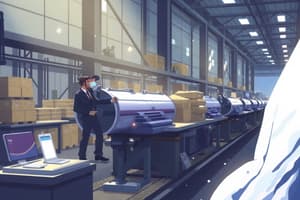Podcast
Questions and Answers
What is a key benefit of integrating ERP systems with activity-based costing systems?
What is a key benefit of integrating ERP systems with activity-based costing systems?
- It eliminates the requirement for process controls.
- It simplifies the budgeting process without any formal measures.
- It improves the accuracy and availability of activity cost driver information. (correct)
- It reduces the need for direct costs calculation.
How do ERP systems contribute to production planning and materials management?
How do ERP systems contribute to production planning and materials management?
- By eliminating the need for JIT systems.
- By linking production planning directly to organizational sales forecasts.
- By facilitating communication along the supply chain. (correct)
- By focusing solely on financial metrics.
What role does activity-based budgeting play in the context of ERP systems?
What role does activity-based budgeting play in the context of ERP systems?
- It does not require the collection of nonfinancial measures.
- It anticipates demand and estimates practical capacity. (correct)
- It focuses exclusively on financial indicators.
- It relies only on historical data for planning.
Which of the following is NOT a feature of SAP’s R/3 system related to materials management?
Which of the following is NOT a feature of SAP’s R/3 system related to materials management?
What is a challenge that activity-based costing systems face according to the content?
What is a challenge that activity-based costing systems face according to the content?
Which characteristic of ERP systems contributes to improved process integrity?
Which characteristic of ERP systems contributes to improved process integrity?
What does activity-based costing allow businesses to do regarding direct costs?
What does activity-based costing allow businesses to do regarding direct costs?
What aspect of traditional production systems is regarded as a limitation?
What aspect of traditional production systems is regarded as a limitation?
What is the primary goal of a manufacturing execution system (MES)?
What is the primary goal of a manufacturing execution system (MES)?
What is a disadvantage of traditional production systems addressed by ERP systems?
What is a disadvantage of traditional production systems addressed by ERP systems?
Which of the following processes is NOT part of Material Resource Planning (MRP)?
Which of the following processes is NOT part of Material Resource Planning (MRP)?
Which component does the Materials Management System NOT directly support?
Which component does the Materials Management System NOT directly support?
What is a major benefit of Just-in-Time (JIT) systems?
What is a major benefit of Just-in-Time (JIT) systems?
What does capacity planning primarily evaluate?
What does capacity planning primarily evaluate?
Which factor is essential for accurate production planning?
Which factor is essential for accurate production planning?
What does the acronym APS stand for in the context of materials management?
What does the acronym APS stand for in the context of materials management?
How does ERP enhance materials management efficiency?
How does ERP enhance materials management efficiency?
Which of these is NOT a function of the production planning system?
Which of these is NOT a function of the production planning system?
What role does collaborative demand management play in ERP systems?
What role does collaborative demand management play in ERP systems?
Which is a challenge faced by Atlantic Manufacturing as mentioned?
Which is a challenge faced by Atlantic Manufacturing as mentioned?
In the context of ERP, what does demand management fundamentally address?
In the context of ERP, what does demand management fundamentally address?
What aspect is prioritized in accurate production scheduling?
What aspect is prioritized in accurate production scheduling?
Activity-based costing systems always rely on financial measures for accuracy.
Activity-based costing systems always rely on financial measures for accuracy.
ERP systems improve the reliability of cost driver information by integrating multiple systems.
ERP systems improve the reliability of cost driver information by integrating multiple systems.
The number of pallet moves is considered an indirect cost driver in materials handling.
The number of pallet moves is considered an indirect cost driver in materials handling.
Activity-based budgeting is solely focused on historical data from previous processes.
Activity-based budgeting is solely focused on historical data from previous processes.
Traditional production systems typically provide a high level of integration within an organization.
Traditional production systems typically provide a high level of integration within an organization.
ERP systems do not enhance communications along the supply chain.
ERP systems do not enhance communications along the supply chain.
Nonfinancial measures used as drivers in ERP systems are collected through a formal process.
Nonfinancial measures used as drivers in ERP systems are collected through a formal process.
Direct costs in activity-based costing can be calculated as part of overhead costs.
Direct costs in activity-based costing can be calculated as part of overhead costs.
SAP’s R/3 system integrates production planning solely without links to material management.
SAP’s R/3 system integrates production planning solely without links to material management.
The primary goal of activity-based budgeting is to reduce labor costs at any expense.
The primary goal of activity-based budgeting is to reduce labor costs at any expense.
The primary objective of Just-in-Time systems is to maintain excess inventory levels.
The primary objective of Just-in-Time systems is to maintain excess inventory levels.
The main advantage of integrating ERP systems is to increase lead times during production.
The main advantage of integrating ERP systems is to increase lead times during production.
Material Resource Planning (MRP) utilizes estimated production goals to dictate when materials should be ordered.
Material Resource Planning (MRP) utilizes estimated production goals to dictate when materials should be ordered.
In the 1960s through the 1980s, production systems were primarily focused on low-volume production of many products.
In the 1960s through the 1980s, production systems were primarily focused on low-volume production of many products.
One of the problems with traditional production systems is the lack of integration between sales and production divisions.
One of the problems with traditional production systems is the lack of integration between sales and production divisions.
Quality control in production systems only involves monitoring finished products and does not include incoming materials.
Quality control in production systems only involves monitoring finished products and does not include incoming materials.
ERP systems enhance productivity by eliminating paperwork and bottlenecks in production processes.
ERP systems enhance productivity by eliminating paperwork and bottlenecks in production processes.
Capacity planning simply estimates the amount of raw materials needed for production without considering production goals.
Capacity planning simply estimates the amount of raw materials needed for production without considering production goals.
The main role of Material Management Systems is to solely track finished products.
The main role of Material Management Systems is to solely track finished products.
Data collection systems within ERP support operational-level processes by providing real-time information.
Data collection systems within ERP support operational-level processes by providing real-time information.
Flashcards
ERP Systems & Activity-Based Costing
ERP Systems & Activity-Based Costing
Integrating ERP systems with activity-based costing improves the accuracy and availability of activity cost driver information.
ERP & Production Planning/Materials Management
ERP & Production Planning/Materials Management
ERP systems facilitate communication along the supply chain for production planning and materials management.
Activity-Based Budgeting in ERP
Activity-Based Budgeting in ERP
Activity-based budgeting anticipates demand and estimates practical capacity within ERP systems.
SAP R/3 Materials Management - NOT
SAP R/3 Materials Management - NOT
Signup and view all the flashcards
Challenge of Activity-Based Costing
Challenge of Activity-Based Costing
Signup and view all the flashcards
ERP & Process Integrity
ERP & Process Integrity
Signup and view all the flashcards
Activity-Based Costing & Direct Costs
Activity-Based Costing & Direct Costs
Signup and view all the flashcards
Traditional Production Systems - Limitation
Traditional Production Systems - Limitation
Signup and view all the flashcards
Manufacturing Execution Systems (MES) Goal
Manufacturing Execution Systems (MES) Goal
Signup and view all the flashcards
Traditional Production Systems Disadvantage
Traditional Production Systems Disadvantage
Signup and view all the flashcards
Material Resource Planning (MRP) - NOT
Material Resource Planning (MRP) - NOT
Signup and view all the flashcards
Materials Management System - NOT
Materials Management System - NOT
Signup and view all the flashcards
Just-in-Time (JIT) Systems Benefit
Just-in-Time (JIT) Systems Benefit
Signup and view all the flashcards
Capacity Planning Focus
Capacity Planning Focus
Signup and view all the flashcards
Production Planning & Accuracy
Production Planning & Accuracy
Signup and view all the flashcards
APS Acronym
APS Acronym
Signup and view all the flashcards
ERP Materials Management Enhancement
ERP Materials Management Enhancement
Signup and view all the flashcards
Production Planning System - NOT
Production Planning System - NOT
Signup and view all the flashcards
Collaborative Demand Management Role
Collaborative Demand Management Role
Signup and view all the flashcards
Atlantic Manufacturing Challenge
Atlantic Manufacturing Challenge
Signup and view all the flashcards
Demand Management in ERP
Demand Management in ERP
Signup and view all the flashcards
Accurate Production Scheduling Priority
Accurate Production Scheduling Priority
Signup and view all the flashcards
Activity-Based Costing & Financial Measures
Activity-Based Costing & Financial Measures
Signup and view all the flashcards
ERP & Cost Driver Reliability
ERP & Cost Driver Reliability
Signup and view all the flashcards
Indirect Cost Driver (Materials Handling)
Indirect Cost Driver (Materials Handling)
Signup and view all the flashcards
Activity-Based Budgeting & Historical Data
Activity-Based Budgeting & Historical Data
Signup and view all the flashcards
Traditional Production Systems Integration
Traditional Production Systems Integration
Signup and view all the flashcards
ERP Impact on Communications
ERP Impact on Communications
Signup and view all the flashcards
ERP & Non-Financial Measures
ERP & Non-Financial Measures
Signup and view all the flashcards
Direct Costs in ABC
Direct Costs in ABC
Signup and view all the flashcards
SAP R/3 & Production/Materials Management
SAP R/3 & Production/Materials Management
Signup and view all the flashcards
Activity-Based Budgeting & Labor Costs
Activity-Based Budgeting & Labor Costs
Signup and view all the flashcards
Just-in-Time Systems & Inventory
Just-in-Time Systems & Inventory
Signup and view all the flashcards
ERP Systems & Lead Times
ERP Systems & Lead Times
Signup and view all the flashcards
MRP & Production Goals
MRP & Production Goals
Signup and view all the flashcards
1960s-1980s Production Focus
1960s-1980s Production Focus
Signup and view all the flashcards
Traditional Production Systems & Integration
Traditional Production Systems & Integration
Signup and view all the flashcards
Quality Control & Incoming Materials
Quality Control & Incoming Materials
Signup and view all the flashcards
ERP & Production Productivity
ERP & Production Productivity
Signup and view all the flashcards
Capacity Planning & Raw Materials
Capacity Planning & Raw Materials
Signup and view all the flashcards
Material Management System & Finished Products
Material Management System & Finished Products
Signup and view all the flashcards
Data Collection Systems in ERP
Data Collection Systems in ERP
Signup and view all the flashcards




